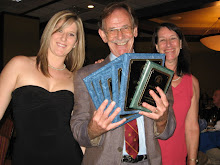The Beats were non-violent. They were branded by the press of the time as delinquents, but in real life the beats packed most of their excess power into sexual liberation and self-expression, not pugilism.
*****
Maybe we didn't get to hear enough about the women of the beat generation because Kerouac's references to single women living on their own in late-1940s New York City were cut by the publishers from his first novel ("The Town and the City," 1950).
*****
What Works on Which Drugs:
"Tristessa" by Jack Kerouac, 1960 ... morphine
"Magic Psalm" in "Kaddish" by Allen Ginsberg, 1961 ... ayahuasca
"Nova Express" by William Burroughs, 1964 ... heroin
"Wales, A Visitation" by Allen Ginsberg, 1967 ... LSD
"Guilty of Everything" by Herbert Huncke, 1990 ... heroin, marijuana, benzedrine
*****
"Standing on the street corner waiting for no one is Power."
*****
"Poetry is the shadow cast by our streetlight imaginations."
"Death is the mother of the Universe."
"One room is all I'll ever own in eternity, one bed -
memory
ramblings
over tall mountains carrying me away to that nomads
land."
from "Writing Poems Is a Saintly Thing"
Top beat sounds:
* “Raindrops in My Coffee” by Sexsmith & Kerr, from “Destination Unknown" (song included in "Radio Bob: Dylan’s theme Time Radio Hour" CD)
* From “Instant Karma: To Save Darfur” - Sierra Leone’s Refugee All Stars’ “Give Peace a Chance,” also Regina Spektor with “Real Love” and Jakob Dylan and Dhani Harrison on “Gimme Some Truth.”
* "Nus Gniik" from the Beatles' latest, “Love.”
*****
The words all in caps in Michael McClure's poetry "never mean that the lines are shouted or that they are chanted," explains the poet. The capital letters are a "disruption of the allure of the poem and a reminder that it is a made thing ... Later I experimented with using the lines of capitals to signify a small shift of intensity in the voice or mind ... The lines of capitals at the opening of the poem came to signify the quality of energy with which a poem begins."
Much of McClure's verse is centered - not so common a practice in the years before word processing. ("By 1955 I began centering poems so that it would be clear they are the stuff of consciousness" - 1991.)
*****
"Jack Kerouac is not for prudish persons. His 146th Chorus'(I almost said Canto, and he does find it hard to get away from the manner of Pound's Analects and Cantos) has unity, a tune, and the feel of the mountains. Allen Ginsberg can foul the nest in a way to marvel at, but it is an innocent enough picture of himself. Gregory Corso has vehemence."
Since the War," a review of Donald Allen's "The New American Poetry:
1945-1960" in The New York Herald Tribune, 26 June 1960
*****
Last words of the 242nd, and last, Chorus of Kerouac's "Mexico City Blues" -
with nobody
To save the old man being hanged
In my closet for nothing
And everybody watches
When the act is done -
Stop the murder and the suicide!
Saturday, December 1, 2007
GleeNinGs
- Gregory Corso
- Lawrence Ferlinghetti
***** - Allen Ginsberg
*****- Peter Orlovsky,
*****(From "Rebel Lions" )
*****- Marianne Moore, from "The Ways Our Poets Have Taken In 15 Years
Subscribe to:
Post Comments (Atom)


2 comments:
I was unaware of this review. It takes some of the sting out of Randall Jarrell's famous quip that Moore was always in danger of running into "dens of innocence."
I was unaware of this review. It takes some of the sting out of Randall Jarrell's famous quip that Moore was always in danger of running into "dens of innocence."
Post a Comment